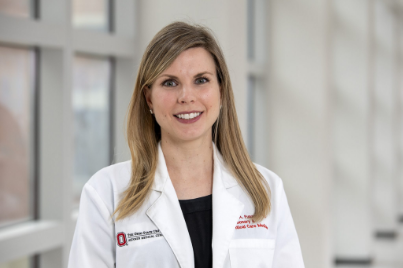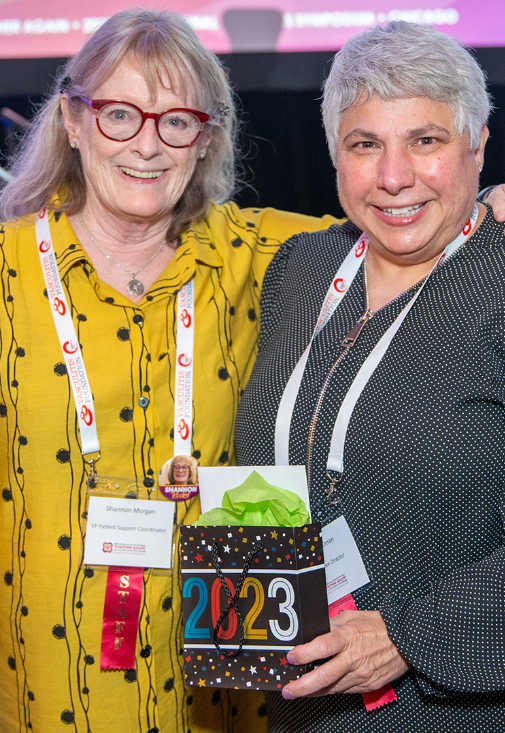VF Funded Research
Apply for Research Funding
The Young Investigator Award provides grants to assist investigators in the early or pilot phase of a study or as additional support for a promising ongoing investigation. It is hoped that these studies will be further developed to attract future funding from other sources.
Call for Research Applications
The application window for 2024 research grants has closed. The 2025 application window will open in the Summer of 2024.
The Young Investigator Award provides grants to assist investigators in the early or pilot phase of a study or as additional support for a promising ongoing investigation. It is hoped that these studies will be further developed to attract future funding from other sources.
Qualifications: Applicants must be five years or less from fellowship graduation.
International Competition: Grant applications are accepted from U.S. and international institutions.
Application deadline: Thursday, August 31, 2023
Awards: $25,000 maximum per year for two years (total $50,000)
FUNDING WILL BE AVAILABLE JULY 2024
The VF Research Program provides one or two-year seed grants to support pilot studies in researching:
- Etiology/Pathogenesis (could include a broad range of studies of immunity, inflammation, or vascular biology. (Relevance to human vasculitis will be taken into account by the reviewers.)
- Epidemiology, including genetics
- Diagnosis, including identification of disease subtypes
- Treatment/Management, including therapeutics to treat vasculitis or prevent complications, biomarkers, and psychosocial outcomes
Goals: To improve the quality of life for patients with vasculitis, and ultimately find the cause/s and cure for vasculitis.
Please register for an account in order to submit your application. Look for the Register button in the top upper right corner of the page.
Grant applications are reviewed on the following criteria:
- Significance: Does this study address an important problem related to vasculitis disease? If the aims of the application are achieved, how will scientific knowledge be advanced? What will be the effect of these studies on the concepts or methods that drive this field?
- Preliminary Evidence: Provide an account of the principal investigator’s preliminary studies or other investigator’s studies pertinent to the application information. Preliminary data can often aid reviewers in assessing the likelihood of the success of the proposed project.
- Experimental design, methods and analysis: Are the conceptual framework design, methods, and analyses adequately developed, well-integrated, and appropriate to the aims of the project? Does the investigator acknowledge potential problem areas and consider alternative tactics?
- Investigator(s): Is the investigator appropriately trained and well suited to carry out this work? Is the work proposed appropriate to the experience level of the principal investigator and other researchers (if any)? Is there evidence the applicant is committed to pursuing research related to vasculitis?
- Institutional Support: Does the scientific environment in which the work will be done contribute to the probability of success? Do the proposed experiments take advantage of unique features of the scientific environment or employ useful collaborative arrangements? Is there evidence of institutional support?
- Are human subjects involved? LOIs and grant applications may be submitted without IRB approval; if the application is selected for funding, the applicant must provide copies of approval by an institutional review board (IRB) or ethics board (EB), before funding will be released
- Animal Welfare: Will vertebrate animals be used in the proposed research? If yes, LOIs and grant applications may be submitted for review without approval, but if accepted for funding, statements of compliance must obtained from the American Veterinary Medicine Association and IACUC local guidelines, or equivalent documentation for non-USA countries.
- Budget: Maximum awards will be for $25,000 per year for a maximum of $50,000 for 2 years.
Restrictions
- Applicants may submit only one grant application per grant review.
- No more than one (1) grant in any given year will be awarded to any institution or major branches of institution.
- Applicants may hold only one grant at any given time from the Vasculitis Foundation. Investigators who are currently receiving funding (as an investigator or member of a team or from a fellowship) from the Vasculitis Foundation are not eligible to receive additional funding. The current study or fellowship must be closed and final narrative and financial reports submitted and approved by the VF Research Team before the investigator is eligible to submit a new grant application.
- Before research can begin, grant agreements must be signed and all approvals such as IRB must be obtained.
Indirect Costs:
Implemented April 2019: The VF adopts the following policy: All budgets for restricted funding shall include at least a 15-20% (of cost) set aside for unrestricted costs for individuals and family foundations and at least a 20% for corporations with exceptions to be approved by VF executive director.
2021 Grant awarded by the Vasculitis Foundation

Investigator: Lynn Fussner, MD
Co-Investigators: Ulrich Specks, MD; Mark D. Wewers, MD; Peter Merkel, MD, MPH
Institution: The Ohio State University, Division of Pulmonary, Critical Care, and Sleep Medicine
Title: Role of Monocytes and Alpha-1 Antitrypsin in ANCA-Associated Vasculitis
Award: $45,000 one-year
Previous Grants awarded by the Vasculitis Foundation
2021 Grants
- Investigator: Lynn Fussner, MD
Co-Investigators: Ulrich Specks, MD; Mark D. Wewers, MD; Peter Merkel, MD, MPH
Institution: The Ohio State University, Division of Pulmonary, Critical Care, and Sleep Medicine
Title: Role of Monocytes and Alpha-1 Antitrypsin in ANCA-Associated Vasculitis
Award: $45,000 one-year
VF Awards Research Grant to Pulmondary/Critical Care Medicine Physician at OSU
2020 Grants
- Investigator: Eric Gapud, MD, PhD
Institution: Johns Hopkins University School of Medicine
Research Project: Mechanisms and patient outcomes for antineutrophil cytoplasmic antibody-associated vasculitis, giant cell arteritis, Behçet’s disease, and Takayasu arteritis
Award: $75,000, funded through the Darwin James Liao, MD, Memorial Fund - Investigator: Dragana Odobasic, PhD, Research Fellow
Co-investigator: Stephen Holdsworth, MD, PhD
Institution: Monash University, Department of Medicine, Melbourne, Australia
Title: Tolerogenic Dendritic Cells for Antigen-Specific Immunosuppression in MPO-ANCA Vasculitis
Award: $49,822
2019 Grants
- Investigator: Maria C. Sid, MD
Co-investigators: Marc Corbera-Bellalta; Nekane Terrades-García; Georgina Espígol-Frigolé; Sergio Prieto-González; Javier Marco-Hernández
Institution: Hospital Clinic, Institute of Biomedical Research, Barcelona, Spain
Title: Effects of Blocking IL-6 Receptor with Tocilizumab on Ex Vivo Cultured Arteries from Patients with Giant-Cell Arteritis. Searching for Predictors of Response.
Award: $48,000 - Investigator: Solbritt Rantapää Dahlqvist, MD, PhD
Co-Investigators: Ewa Berglin, MD, PhD; Johanna Dahlqvist, MD, PhD; Ingegerd Johansson, DDS, PhD; Linda Johansson, PhD
Institution: Umeå University, Umeå, Sweden
Title: Analyses of antibodies, biomarkers and microbiome in relation to genetic markers in pre-clinical individuals developing antineutrophil cytoplasmic antibody associated vasculitis
Award: $100,000
2018 Grants
- Investigator: Dan Jane-Wit, MD, PhD
Co-investigator: Caodi Fang, MS
Institution: Yale University, Department of Internal Medicine
Title: Endothelial Cell lnflammasomes in ANCA-Associated Vasculitis
Award: $25,000 for first year; $25,000 for second year - Investigators: EUVAS Council: Ingeborg Bajema, Thomas Hauser, David Jayne, Alfred Mahr and Kerstin Westman), Peter Hoglund, Lund, Sweden; Mikkel Fauschou, Copenhagen, Raashid Luqmani, Oxford, and Laura Moi
Institution: University of Cambridge, United Kingdom
Title: Long term patient follow-up of ANCA associated vasculitis, An international inception cohort study by the European Vasculitis Society
Award: $62,000 one-year - Investigator: Sonia Sharma, PhD
Co-Investigators: Rekha Dhanwani, PhD; Mohit Jain, MD, PhD
Institution: La Jolla Institute for Allergy and Immunology, Department of Cell Biology
Title: Metabolic dysregulation of pro-inflammatory responses in DADA2 vasculitis
Award: $50,000, one-year
2017 Grants
- Investigator: Mark Gorelik, MD, Co-investigator: Stephanie Davis, MS
Institution: Pediatric Rheumatology, Baylor College of Medicine
Title: Follistatin Like 1 Protein Blockade in Kawasaki Disease
Award: $25,000, one-year - Investigator: Divi Cornec, MD, PhD
Co-investigators: Ulrich Specks, MD, Pers Jacques-Olivier, PhD
Institution: Mayo Clinic, Rochester, Minnesota
Title: In Depth Characterization of PR3-specific B Cells in ANCA-associated Vasculitis
Grant: $100,000, two-years - Investigator Mary H. Foster, MD
Co-investigators: Amy Clark, PhD, Robert Tighe, MD
Institution: Nephrology, Duke University
Title: Dual immunization to model gene-environment interactions in ANCA vasculitis
Grant: One-year, $49,946 - Investigator: Nataliya Milman, MD, FRCPC, MSc
Co-investigators: Peter Merkel, Annelies Boonen, Peter Tugwel, George A. Wells, Paula Patterson
Institution: Rheumatology, Ottawa Hospital Research Institute
Title: ICF Core Sets for ANCA-Associated Vasculitis
Grant: Two-year, $20,000
2016 Grants
- Analysis of Glycosylation of Proteinase 3-ANCA IgG Variable Domains, $49,500
Prof. dr. Peter Heeringa, Department of Pathology and Medical Biology, Vasculitis Expertise Center, University Medical Center, Groningen, Netherlands - Rational Treatment of Glomerulonephritis using a Novel Urine Biomarker, $49,294
Professor Mark Little, Trinity Health Kidney Centre, Nephrology, Renal Inflammation Group, St. James Hospital, Dublin, Ireland - A Randomized Multi-center Study for Isolated Skin Vasculitis (ARAMIS), $50,479
Robert Micheletti, MD, Assistant Professor, Dermatology and Medicine, University of Pennsylvania, Philadelphia, Pennsylvania
2015 Grants
- Immune Regulation by IL-6 in Giant Cell Arteritis, $50,000
Jonathan Choy, PhD, Simon Fraser University, Burnaby, British Columbia Canada - Longitudinal Study of Morbidity and Mortality in Vasculitis Patients, $98,641 (two-year study)
Susan Jick, DSc, Professor of Epidemiology, Director Boston Collaborative Drug Surveillance Program Boston University School of Public Health, Boston, Massachusetts - Role of LAMP-2 in Tolerance to ANCA Antigens, $50,000
Renate Kain, MD, PhD, Medical University of Vienna, Vienna, Austria
2014 Grants
- The Role of micro RNA in a Novel Mouse Model of Vasculitis, $50,000
Carola G. Vinuesa, MD, MSc, PhD, John Curtin School of Medical Research The Australian National University, Canberra City, Australia - Rho-kinase Activity in Large Vessel Vasculitis, $50,000
Lindsay Lally, MD, principal investigator, Rheumatology Fellow; Robert Spiera, MD, co-investigator, Hospital for Special Surgery, New York - Microbubble Contrast-Enhanced Vascular Ultrasonography: A Novel Method of Detecting Large Vessel Vasculitis? $50,000
Kimberly P. Liang, MD, Assistant Professor of Medicine, Division of Rheumatology and Clinical Immunology, University of Pittsburgh, Pittsburgh, Pennsylvania
2013 Grants
- Circulating microparticles as therapeutic targets of plasma exchange in antineutrophil cytoplasmic antibody (ANCA) associated vasculitis, $99,206 (two years)
Paul Brogan, FRCPCH, reader in vasculitis and honorary consultant pediatric rheumatologist, UCL Institute of Child Health and Great Ormond Street Hospital NHS Foundation Trust, London, United Kingdom - To Understand the Role of 14-3-3 In Giant Cell Arteritis (GCA), $50,000
Ritu Chakravarti, Ph.D., research associate, Department of Pathobiology, Cleveland Clinic Lerner Research Institute, Cleveland, Ohio - Disease-specific dysregulation of miRNA in Granulomatosis with Polyangiitis (GPA/Wegener’s), $50,000
Susanne Schinke, MD, research fellow, Department of Rheumatology and Clinical Immunology, The University of Lübeck, Germany - Development of a uniform histology scoring systems for Small Vessel CNS Vasculitis in adulthood and childhood, $40,128
Susanne Benseler, MD, pediatric rheumatologist, associate professor of paediatrics, The Hospital for Sick Children, University of Toronto, Canada
2012 Grants
- Impact of Healthcare Utilization & Informal Caregiving for Primary Systemic Vasculitis: A National Perspective, $99,920
Carolyn T. Thorpe, PhD, MPH, Pharmacy and Therapeutics, University of Pittsburgh, Pennsylvania - Exome sequencing in granulomatosis with polyangiitis (GPA, Wegener’s), $50,000
Sharon Chung, MD, MAS, Division of Rheumatology, University of California, San Francisco - Investigating the molecular mechanism for IL-25-driven Act 1-dependent eosinophilic vasculitis, $50,000
Shadi Swaidani, PhD, Cleveland Clinic Lerner Research Institute, Cleveland, Ohio - Small molecule therapeutics in Giant Cell Arteritis, $50,000
Cornelia Weyand, MD, PhD, Stanford University School of Medicine, California
2011 Grants
- Defining an animal model for the study of Wegener’s Granulomatosis, $75,000
Felipe Andrade, MD, PhD, The Johns Hopkins University, Baltimore, Maryland
2010 Grants
- Reproductive Health in Young Men and Women with Vasculitis, $49,978
Megan E. B. Clowse, MD, Rheumatology and Immunology, Duke University, Raleigh, North Carolina - Classification and Diagnostic Criteria in Primary Systemic Vasculitis, $99,738
Raashid Ahmed Luqmani, MD, Nuffield Department of Orthopaedics Rheumatology & Musculoskeletal Science Oxford, England - Identification of susceptibility genes in Takayasu’s arteritis, $50,000
Amr H. Sawalha, MD, Oklahoma City, Oklahoma
2009 Grants
- PARP-1 in CSS-associated IL-10 Promoter Polymorphisms, $50,000
Jianguo Liu, MD, PhD, Division of Immunobiology, Department of Internal Medicine, Saint Louis University School of Medicine, Saint Louis, Missouri
2008 Grants
-
Vasculitic T Cells in Giant Cell Arteritis, $99,583
C.M. Weyand, MD, Emory University, Atlanta, Georgia - An Investigation of the Role of the Innate Immune Response in Kawasaki Disease, $49,980
Neil Bowles, PhD, Eccles Institute of Human Genetics, University of Utah, Salt Lake City, Utah - Investigating the role of the novel Th 17 cells in the pathogenesis of ANCA associated vasculitis and their potential for immunomodulation, $48,000 Alan Salama, MBBS, PhD, FRCP, Renal Section, Division of Medicine Imperial College London, England
2007 Grants
- ANCA Vasculitis: Autoimmune B Cell dysregulation and its Clinical Impact, $50,000
Patrick Nachman, MD, University of North Carolina Kidney Center, Chapel Hill, North Carolina - Expression and activation of p38MAPK isoforms in ANCA-associated renal vasculitis, $50,000
Jochen Zwerina, MD, Department of Internal Medicine 3 and Institute for Clinical Immunology, University of Erlangen, Germany
2006 Grants
-
Identification and characterization of immunodominant, conformational epitopes of antineutrophil cytoplasmic antibodies, $35,000
Antje Mueller, MD, Csernok, MD, Peter Lamphrect, MD, University of Rheumatology, University Hospital Schleswig-Holstein, Campus Lubeck, Germany -
Gene Expression Profile of Temporal Arteries of Giant Cell Arteritis, $35,000
Rula Hajj-Ali, MD, Cleveland Clinic, Cleveland, Ohio
2005 Grants
- Environmental Factors in the Pathogenesis of Wegener’s Granulomatosis, $35,000
Daniel Albert, MD, University of Pennsylvania School of Medicine, Philadelphia, Pennsylvania - Localized Wegener’s Granulomatosis: Epidemiological, clinical and histopathological characteristics, $30,000
Peer Malte Aries, MD, and Prof. Wolfgang L. Gross, MD, Department of Rheumatology, University Hospital of Schleswig-Holstein - A Pilot Project Towards Establishment of a US/Canadian Diagnostic Registry of Children with Wegener’s Granulomatosis and Related Vasculitides, $34,900
David A. Cabral, MBBS, BC Children’s Hospital, Vancouver, British Columbia, Canada - Renal transplantation in Wegener’s granulomatosis: mortality, allograft outcomes and incidence of malignancies from the United Network for Organ Sharing database 1988-2005, $16,000
Nadine Tanenbaum, MD, Duke University, Raleigh, North Carolina
2004 Grants
- Identification of novel Wegener’s Granulomatosis Susceptibility Genes, $35,000
Katherine Siminovitch, PhD, Mount Sinai Hospital, Toronto, Ontario, Canada - Wegener’s Granulomatosis and Microscopic Polyarteritis Case Control Study in Western Montana, $7,500
Andrew Zeft, MD, Division of Immunology and Rheumatology, Department of Pediatrics, University of Utah, Salt Lake City, Utah - Development of a Measure to Assess Patients’ Adherence to Vasculitis Treatment Regimens, $35,000
Robert DeVellis, PhD, Associate Director, Arthritis Multidisciplinary Clinical Research Center, University of North Carolina, Chapel Hill, North Carolina - Analysis of NKG2D expression on CD28- T-cells and non-classical MHC-class I antigen expression on antigen-presenting cells as clues to an antigen-driven process and new targets of treatment in Wegener’s granulomatosis, $35,000
Prof. Wolfgang L. Gross, MD, and Peter Lamprecht, MD, Department of Rheumatology, University Hospital of Schleswig-Holstein, Campus Luebeck, and Rheumaklinik Bad Bramstedt, Germany
2003 Grants
- The role of shear stress in neutrophil proteinase-3 expression and its importance in vascular injury sites in Wegener’s granulomatosis, $35,000
Deborah Stearns-Kurosawa, PhD, Oklahoma Medical Research Foundation, Oklahoma City, Oklahoma
2002 Grants
- Host-microbial interactions in Wegener’s Granulomatosis: the role of ANCA and S. aureus persistence, $35,000
Robert Inman, MD, University of Toronto, Canada - Short-Term Cyclophosphamide Therapy in a Cohort of Over 200 Patients, $35,000
Gary Hoffman, MD, MS and Alexandra Villa-Forte, MD, MPH, The Cleveland Clinic, Cleveland, Ohio


